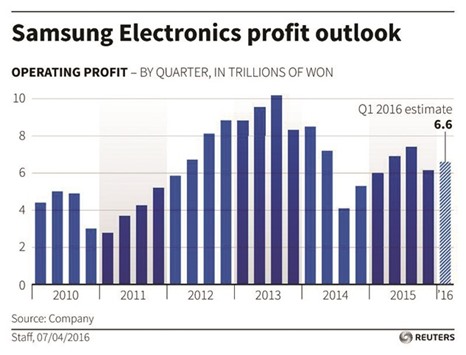Samsung Electronics yesterday posted a better-than-expected 10% increase in first-quarter profits, on robust sales of the South Korean electronics giant’s new Galaxy S7 smartphone.
The world’s largest smartphone producer said operating profit in the January-March period was expected to reach around 6.6tn won ($5.6bn), up from 6.0tn won a year ago.
The profit figure was substantially higher than the 5.53tn-won average of analysts’ estimates compiled by Bloomberg News, and up from the 6.1tn won posted in the fourth quarter of 2015. The result will encourage shareholders after a disappointing 2015 that saw Samsung lose more than $8bn in market value, with its flagship smartphone business sandwiched by top-end rivals like Apple’s iPhone and lower-end devices from fast-growing Chinese outfits like Huawei and Xiaomi. In an effort to defend its smartphone share, Samsung rolled out the latest version of its flagship Galaxy smartphone in March – a month earlier than the previous year and ahead of new launches by its competitors.
The combined shipments of the Galaxy S7 and Galaxy S7 Edge are estimated to have reached 10mn units within 20 days after the launch.
“We expect the Galaxy S7 to be the world’s best-selling Android smartphone in 2016,” said Neil Mawston, executive director at Strategy Analytics.
“Samsung’s range of lower-cost models, like the J series, is also selling well,” Mawston said. At the same time, the South Korean won has weakened against the dollar, providing a pricing edge for exports. Samsung estimated overall sales for the first quarter at 49tn won, up from 47.1tn won a year before.
Yesterday’s forecast, which comes ahead of audited results to be released this month, did not provide a net income figure or breakdown of divisional earnings for the company’s mobile, TV, semiconductor and display units.
The performance of the Galaxy S7 is expected to have pushed the mobile division back up to top spot as Samsung’s largest earnings source. In recent quarters that position had been taken by the conglomerate’s chip business, which had picked up the slack when the once all-conquering mobile unit started to flag.

..
